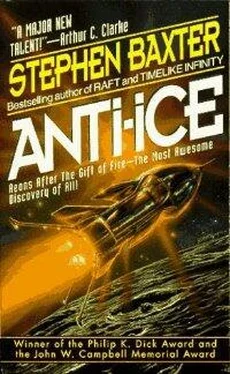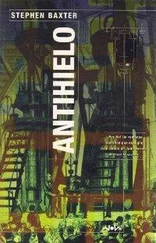I nodded thoughtfully. “So the Balance of Power is shattered; that Balance which has survived since the Congress of Vienna—”
“A Balance which Britain has fought to maintain ever since.” He drummed his fingers on the table top. “Let us be frank, Ned. The British government could scarcely give two hoots if Prussian guns lay Paris waste; for the French, in British minds, are bedevilled by the twin monsters of revolution and military expansionism. And these absurd franc-tireur attacks on British economic targets, like the dear old Prince Albert, are hardly endearing.
“But the development of a new Germany will be greeted with dread in Whitehall. For it has long been an objective of British foreign policy that there should be no dominant power in central Europe.”
I frowned, and was struck by the cynicism of this view of British goals—for surely the maintenance of a peaceful settlement was to be lauded. “Tell me what you’re afraid of, sir,” I said directly.
His bony fingers drummed more loudly. “Ned, up to now the British have stayed out of this damn war of Bismarck’s; and quite right too. But how long before British interests are so endangered by the emergence of Germany that they feel forced to intervene?”
I thought that over. “But the British Army, while the finest in the world, is not well-equipped for large engagements in central Europe. Nor has it ever been. And besides, many of our troops and officers are scattered around the world in the service of His Majesty in the colonies. Surely Mr. Gladstone would not commit us to a foreign adventure with no chance of success.”
“Gladstone. Old Glad Eyes.” He laughed without humor. “Gladstone, I have always felt, is a pompous oaf, and not a patch on Disraeli for wit or intelligence. Obviously Disraeli’s ‘flood-gate’ suffrage reform of 1867 would have been a disaster for the country… Who knows what damage might have been done? Certainly industry would have been denied its rightful say in affairs—perhaps we would still have the nonsensical situation of London as capital! What a ludicrous thought. So perhaps it’s a good thing that Dizzy retired, bruised, from politics, to concentrate on his bizarre literary adventures… but still, one misses the fellow’s dash.
“Perhaps, though, it is a blessing that we have a Glad Eyes inflicted on us in this hour; for, as you say, he and his gang of milksop Whigs would surely be loth to commit us to an absurd adventure… And if the rumors are true he may be more interested in ventures to Soho than Sedan.”
I guffawed at that disrespectful sally.
Traveller continued, “So perhaps Gladstone would not launch us into war in Europe. But… he has other options.”
“Tell me what you mean, Sir Josiah.”
He leaned forward now, folding his arms on the table. “Ned, you will recall your brother’s experiences in the Crimea.”
For a moment these dark words, uttered sepulchrally in the midst of that bright farmhouse morning, made no sense to me; and then, in a sudden, shocking moment, I understood. “Dear Lord, Traveller.”
He was, of course, suggesting that anti-ice weapons might be deployed once more by the British Army; and this time, not in some distant, oddly-named peninsula of southern Russia—but in the heart of Europe herself.
I searched his face for some sign that I was mistaken in my interpretation; but all I saw in those long, somber features was a terrible fear, coupled with immense anger. He said, “Anti-ice weapons could reduce the Prussian Army in minutes. And Gladstone knows this. Bismarck has surely gambled on the unwillingness of the British to become entangled in European disputes—but the pressure on Gladstone to use this astounding advantage must be growing by the day.”
I watched the fear and anger wrestle in Traveller’s eyes, and imagined this brusque but fundamentally gentle man once more forced to labor over weapons of war. On impulse I grabbed at his sleeve. “Traveler, you have brought us to the Moon and back. You have immense strength; I have every confidence that you will not allow your genius to be employed in any such fashion.”
But his fear lingered; and Traveller pawed at the newspapers once more, as if seeking some glimmer of hope in their fading words.
* * *
Our idyll was not to last more than a few minutes beyond the end of that conversation. The first fist to hammer at the Lubbocks’ door was that of the Mayor of the nearest town—whose name we had not even learned yet—and, as I studied this gentleman’s portly, mud-spattered frame and empty smile, I realized, with a sink of the heart which startled me, that I was indeed home.
We were whisked away from our corner of Kent. We were given little time to say goodbye to each other—which is perhaps as well, for I felt a surprisingly strong bond with my fellow voyagers. I would not go so far as to say I experienced a nostalgia for those long weeks trapped in the Phaeton, but I did feel quite exposed without my companions close by.
Traveller soon installed himself in a pleasant inn close to the Lubbocks’ field where his precious Phaeton lay, and threw himself into the restoration of the craft to his laboratory in Surrey. The faithful Pocket begged, and was granted, a few days’ leave to visit his precious grandchildren and reassure them of his continued existence; then, as usual, he returned to work, determining and quietly serving his employer’s needs.
As for Bourne, he was taken without ceremony from Kent under close arrest, and soon disappeared into the complexities of international law. The confusion of the case brought against him as a saboteur by the British, an extradition warrant issued by the Belgians, and protests lodged by the beleaguered French government—not to mention the practical difficulties of communication with that nebulous body—all conspired to threaten the hapless Bourne with a long imprisonment before even he came to trial.
Holden, as soon as he could, made for Manchester, urging us not to disclose details of our adventure to any other journalist. It was amusing to see how his ample form, reduced to the status of a sack of potatoes wheeled about in a bath chair, became filled with agitation as the size of the story he had to tell—and the subsequent fees he would command—grew ever larger in his scribbler’s mind; it was as if one could see his very fingers itching.
Still, Holden’s account, when it appeared in the Manchester press a few days later, did come close to doing justice to our adventure. I read through the rather lurid prose and will admit to some shivers of remembered terror as he evoked my jaunt through the vacuum and (as he overstated it) my battle with the rock monsters of Luna. The piece in the Manchester Guardian was handsomely illustrated by lithographs of various scenes from the account, and was topped off by a reproduction of Holden’s famous photograph of myself and the ill-fated model of Brunel’s ocean liner.
My only disappointment was with Holden’s unsympathetic portrayal of Traveller. The journalist dwelled on Traveller’s near-Anarchist sympathies in a manner which aroused adverse comment about the engineer, even at this moment of his greatest fame. I took the opportunity to read more widely on the various Anarchist thinkers—dismissing the insurrectionist crackpots such as Bakunin, and concentrating on the deeper thinkers like Proudhon, who declared that the desire for property and political power served only to encourage the violent and irrational elements in man.
Surely, I reflected, this present war in Europe was ample evidence for Proudhon’s thesis, and I regretted Holden’s disloyalty.
In any event, thanks to Holden’s account, I became briefly famous.
Читать дальше












